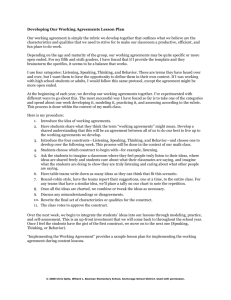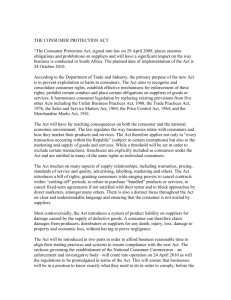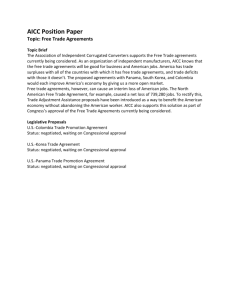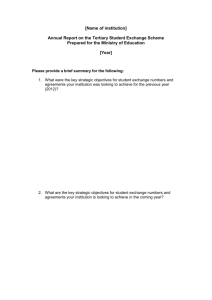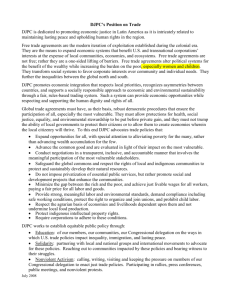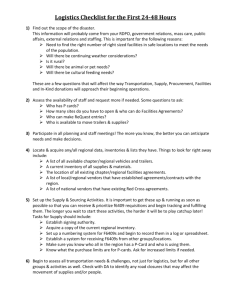Trading Standards Service
advertisement
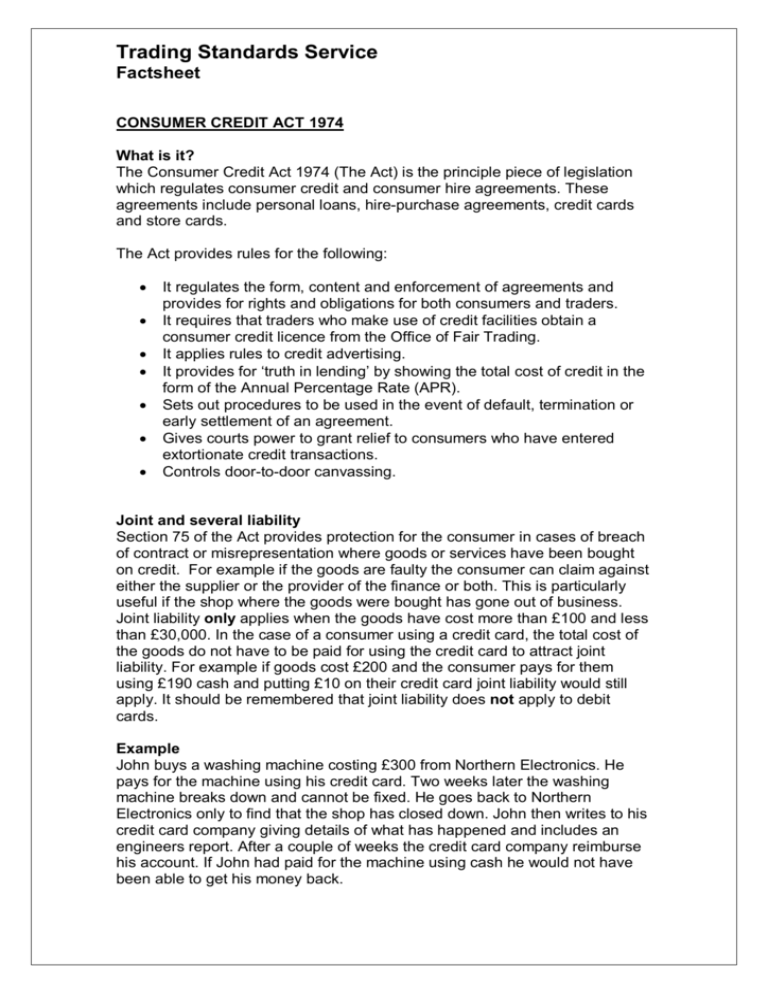
Trading Standards Service Factsheet CONSUMER CREDIT ACT 1974 What is it? The Consumer Credit Act 1974 (The Act) is the principle piece of legislation which regulates consumer credit and consumer hire agreements. These agreements include personal loans, hire-purchase agreements, credit cards and store cards. The Act provides rules for the following: It regulates the form, content and enforcement of agreements and provides for rights and obligations for both consumers and traders. It requires that traders who make use of credit facilities obtain a consumer credit licence from the Office of Fair Trading. It applies rules to credit advertising. It provides for ‘truth in lending’ by showing the total cost of credit in the form of the Annual Percentage Rate (APR). Sets out procedures to be used in the event of default, termination or early settlement of an agreement. Gives courts power to grant relief to consumers who have entered extortionate credit transactions. Controls door-to-door canvassing. Joint and several liability Section 75 of the Act provides protection for the consumer in cases of breach of contract or misrepresentation where goods or services have been bought on credit. For example if the goods are faulty the consumer can claim against either the supplier or the provider of the finance or both. This is particularly useful if the shop where the goods were bought has gone out of business. Joint liability only applies when the goods have cost more than £100 and less than £30,000. In the case of a consumer using a credit card, the total cost of the goods do not have to be paid for using the credit card to attract joint liability. For example if goods cost £200 and the consumer pays for them using £190 cash and putting £10 on their credit card joint liability would still apply. It should be remembered that joint liability does not apply to debit cards. Example John buys a washing machine costing £300 from Northern Electronics. He pays for the machine using his credit card. Two weeks later the washing machine breaks down and cannot be fixed. He goes back to Northern Electronics only to find that the shop has closed down. John then writes to his credit card company giving details of what has happened and includes an engineers report. After a couple of weeks the credit card company reimburse his account. If John had paid for the machine using cash he would not have been able to get his money back. Trading Standards Service Factsheet What is a regulated agreement under the Act? The Consumer Credit Act 1974 only applies to regulated agreements made by individuals. A regulated agreement is where the amount of credit is not over £25,000 and in the case of hire agreements where the payments are not required to exceed £25,000 and the agreement is capable of lasting 3 months. (These financial limits have been amended by the Consumer Credit Act 2006). Can the consumer get out of an agreement they believe to be extortionate? The Act gives the courts power to grant relief to consumers who have entered into extortionate credit transactions. This applies to all agreements and is not confined to agreements that are regulated by the Act. An agreement is defined as extortionate if it requires the consumer to make payments which are grossly exorbitant. It is ultimately for a court to decide whether an agreement is extortionate. If the court believes the agreement is extortionate it can take various courses of action, one of which includes setting aside all obligations the consumer may have. (The Extortionate credit provisions were replaced by an ‘Unfair Relationship test’ in 2007 which has made it easier for consumers to challenge agreements which they believe to be unfair*) Can I cancel an agreement if I change my mind? An agreement is cancellable where the consumer has spoken face to face with the trader and signed away from trade premises. Dependant on the type of agreement, the consumer will receive either a second copy of the agreement or a copy of their cancelation rights. The consumer then has 5 days to cancel following receipt of either of these documents. The consumer must cancel in writing. The cancelation provisions under the Act do not apply to agreements made by the Internet or telephone, however the consumer can use the cancelation provisions in the Consumer Protection (Distance Selling) Regulations 2000. Example Kate buys a television from Northern Electrics and after talking to the salesman takes the credit agreement home and signs it. The television is delivered the next day. A few days later Kate receives a copy of her agreement which include the cancellation provisions. She has seen another television that she likes so writes the next day to the finance company telling them she wishes to cancel. The television is then returned and she has no obligations under the agreement. If a consumer has any queries concerning credit agreements they should contact Consumerline on 0845 6006262. *Please note – students will not receive an examination question on the new legislation before 2010.
